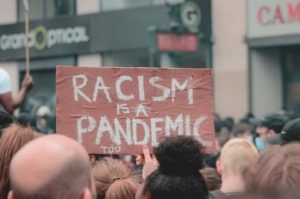Module 1. The Significance of Ethnic Studies
RACE-ETHNIC GROUP PERCEPTIONS
All Americans are indoctrinated in the patriotic principles of our nation’s history and the ideologies of equality and freedom; however, these ideologies as defined by the founding fathers and the United States Constitution are largely free of critical examination or criticism (Parenti, 2006). Racial framing people of color dates back to our early history of colonialism and slavery which established the foundation for White-dominated policies and institutions that today continue to legitimize and encourage racists practices. In the United States, racist thought, sentiments, and actions are structured into everyday life such that large portions of the White population do not view racists words, imagery, or commentary as serious (Feagin, 2014). Racial framing is concrete and advantageous for Whites, while it constructs obstacles and is painful for Americans of color. Everyone is directly and indirectly impacted by racial framing.
Systemic racism in our institutions by its very definition creates and maintains racial oppression. In the United States, systemic racism is the “culture.” The policies and norms created by the racist system is socially reproduced like any other form of culture. What Americans call collective culture is selective transmission of elite-dominated values (Parenti, 2006). We are socialized to understand and maintain the ideologies of our ancestors even if we are the racial-oppressed or the racial oppressors (Feagin, 2014). The culture is embedded in our systems we live in (e.g., economy, politics, education, religion, family, etc.) so it becomes unconscious in our everyday lives and practices. Not everyone is aware of or sees racism because it is a social norm.
This systemic structure of racism embodies other forms of societal differences and establishes norms within those social categories as well. This includes formal and informal norms around (dis)ability, age, gender, sexuality, social class, among others. These categories are interconnected and apply to individual and group systems of disadvantage and discrimination. The intersectionality of social categorizations creates overlapping and interdependent systems of oppression. For example, the social markers of “Black” and “female” do not exist independently in one’s life experience. It is the intersection of these categories that influences the life’s opportunities or challenges, such as Black women earning $0.62 for every $1.00 by men of all races (Center for American Progress, 2018; U.S. Census Bureau of Labor Statistics, 2019).
The ongoing denial of systemic racism has resulted in racial disparities and inequality among Americans of color including voter discrimination, racial profiling and police brutality, school segregation, housing discrimination, inequity and intolerance in college and professional sports, discrimination against faculty and administrators in higher education, and pro-White favoritism in top-level employment sectors and boards of directors (Feagin, 2014). The denial of racism stems from the ideologies of our founding fathers designed during the 1787 Constitutional Convention. Many convention delegates of the time were anti-democratic in their thinking fearing the “masses.” At least 40% of the delegation were slaveowners and many others were merchants, shippers, lawyers, and bankers who profited from commerce in slave-produced products or supplies (Feagin, 2014). The founding fathers were aware of how they profited from slavery, and despite this understanding would describe their own sociopolitical condition with England as “slavery by taxation without consent.” To this end, the Constitutional Convention built a new nation to protect the wealth of our founding fathers and those like them by defining rights using social labels and categories such as Americans from Africa as “slaves by natural law,” indigenous peoples as “separate nations,” or altogether excluding people, like women, by directly avoiding inclusion. These policies and ideologies have become the foundation of American tradition.

The creation of a national racial order established at the Constitutional convention has ensued severe consequences for centuries and yet remains the United States moral foundation. At no point has a new Constitution or convention been held by representatives of all people to delete the original text of racist provisions or eradicate the institutions that continue to hold Americans of color in bondage (Douglas, 1881; DuBois, 1920; Feagin, 2014). The Constitution created and maintained racial separation and oppression that has ensured White, elite men would rule for centuries. Ordinary and poor Whites, even today, accept racialized order because a White ruling class benefits White Americans and creates a positive image of Whiteness.
Most recently, social scientists, analysts, and a new generation of Americans have argued that there has been little attention on the racial histories, policies, and discrimination of people of color in the United States (Feagin, 2014). There have been a variety of amendments and resolutions by the U.S. government to acknowledge the racial injustice of our past such as the 2009 non-binding apology on the injustice of slavery and Jim Crow laws. However, these acts do not provide real commitments or congressional actions to address the long-term impacts of racial oppression or reduce contemporary racial discrimination (Feagin, 2014).
Considering the recent, high-profile incidents of police violence against African Americans, what is the likelihood of racial change in the United States? Will contemporary racial issues and social awareness change the way Americans think? According to a Pew Research Center survey by Horowitz, Parker, Brown, and Cox (2020), approximately 76% of Americans note a major or minor change in the way they think about race and racial inequality, but only 51% believe there will be major policy changes to address racial inequality. Results from the same survey found African Americans (86%), Asian Americans (56%), Latinx Americans (57%), and Whites (39%) believe when it comes to giving Black people equal rights with White people, our country has not gone far enough. Approximately 48% of these respondents say more people participating in training on diversity and inclusion would do a lot to reduce inequality.

